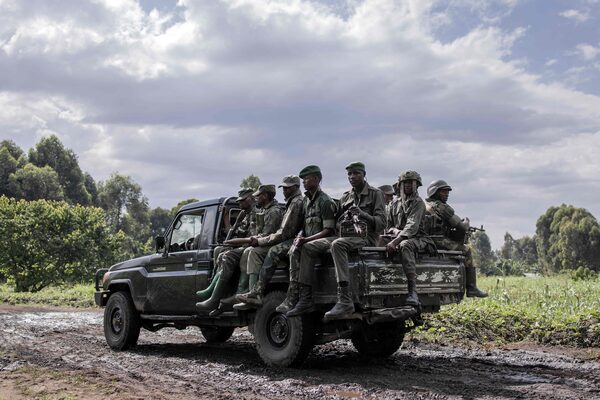
M23 soldiers leave leave Rumangabo camp after the meeting between EACRF officials and M23 rebels during the handover ceremony at Rumangabo camp in eastern Democratic Republic of Congo on Jan. 6.GUERCHOM NDEBO/AFP/Getty Images
The Rwandan-backed M23 rebel movement is entrenching its rule in eastern Congo by setting up parallel administrations to control border crossings and impose taxes on the impoverished local population, a United Nations report says.
The report by an UN-appointed expert panel, submitted to the UN Security Council, documents how M23 rapidly expanded the territory under its control in the Democratic Republic of the Congo last year and then required local people to pay taxes to finance its military operations.
Previous reports by UN officials and peacekeepers have described a range of M23 atrocities in eastern Congo, including massacres and executions of villagers, indiscriminate shelling, the killing and injuring of children, and rocket attacks on a UN helicopter and a school. The reports have also documented Rwanda’s extensive military support for the rebels.
The M23 conflict has triggered a war of words between the Congolese government and Rwandan President Paul Kagame. Earlier this month, Mr. Kagame threatened to expel thousands of Congolese refugees from his country if Congo continues to blame Rwanda for the crisis.
The parallel administrations set up in Congo by the insurgent militia are well-organized and extensive. They include intelligence networks, military training camps, a hierarchy of appointed officials at several levels, a tax system and the takeover of border posts, the UN report says.
The parallel governments are a sign that the Rwandan-backed rebels have no intention of pulling out of eastern Congo any time soon, despite recent peace negotiations that led to an M23 withdrawal from a few towns. The rebels are within striking range of Goma, one of the biggest cities in the region, sparking fears that they could again capture the city, as they did for a brief period in 2012.
Congo is one of the largest countries in Africa, with vast resources of gold and other minerals, but its people are among the poorest in the continent and its territory has been repeatedly invaded by its neighbours over the past three decades.
The taxes imposed by M23 are the latest burden on the Congolese. In areas controlled by the rebel group, cattle owners are required to pay a tax of US$7 for every head of livestock, while farmers must pay US$3 to gain access to their own land, the UN report said. Households and agricultural crops are also taxed, it said.
At border posts controlled by M23 on the Ugandan border, anyone entering or leaving Congo carrying goods is forced to pay a levy, the UN report said.
It included a list of several towns and villages where M23 has appointed chiefs, intelligence agents and lower-ranking officials. Congolese media have reported that the parallel administrations are so elaborate that even teachers and sanitation officials have been appointed.
The militia, formally known as the March 23 Movement, is named after a peace agreement in 2009 that it says was violated by Congo. After capturing Goma a decade ago, it was eventually pushed back and defeated, but it revived in 2021 and began sweeping across eastern Congo, triggering a massive refugee crisis and forcing an estimated 450,000 people to flee their homes last year.
In one of the most horrific atrocities committed by the rebel group, M23 executed at least 131 people and abducted and raped dozens of others in two captured villages over a two-day period in late November, according to an investigation by UN peacekeepers. The rebels tried to cover up the killings by burying the bodies and preventing people from leaving the two villages, the investigation found.
The United States has repeatedly urged Rwanda to stop supporting M23. Rwanda has denied the allegation, but a leaked UN report in July contained lengthy documentation – including photos, videos and drone footage – showing how Rwanda provided troops, weapons and equipment to M23. Photos have shown that the rebels are as well-equipped as any conventional army, often with new uniforms and body armour.
In their latest report, the UN experts said M23 often co-ordinated its military operations with Rwandan soldiers who had crossed the border from Rwanda, sometimes marching in columns. In some cases, M23 and Rwandan troops had jointly attacked Congolese military positions or jointly captured key towns and regions, it said.
In areas controlled by M23 in eastern Congo, “pillaging, theft, extortion, abduction, torture, rape and killings were frequent,” the report said.
 Geoffrey York
Geoffrey York